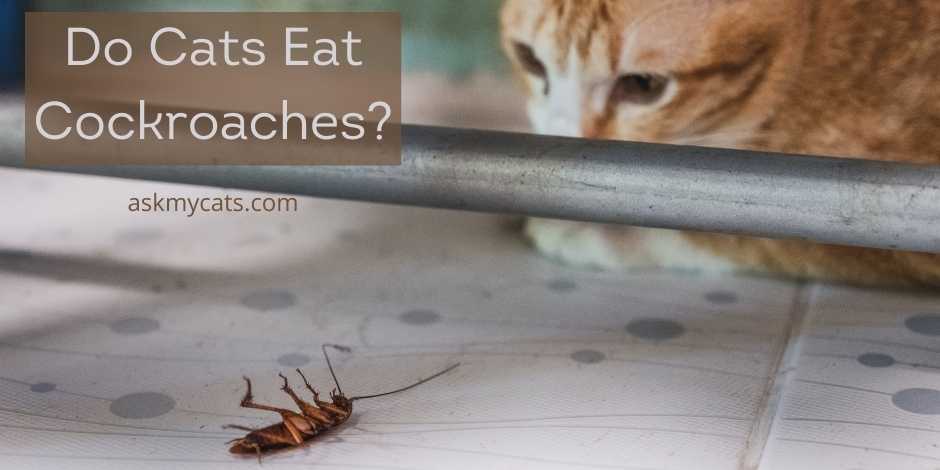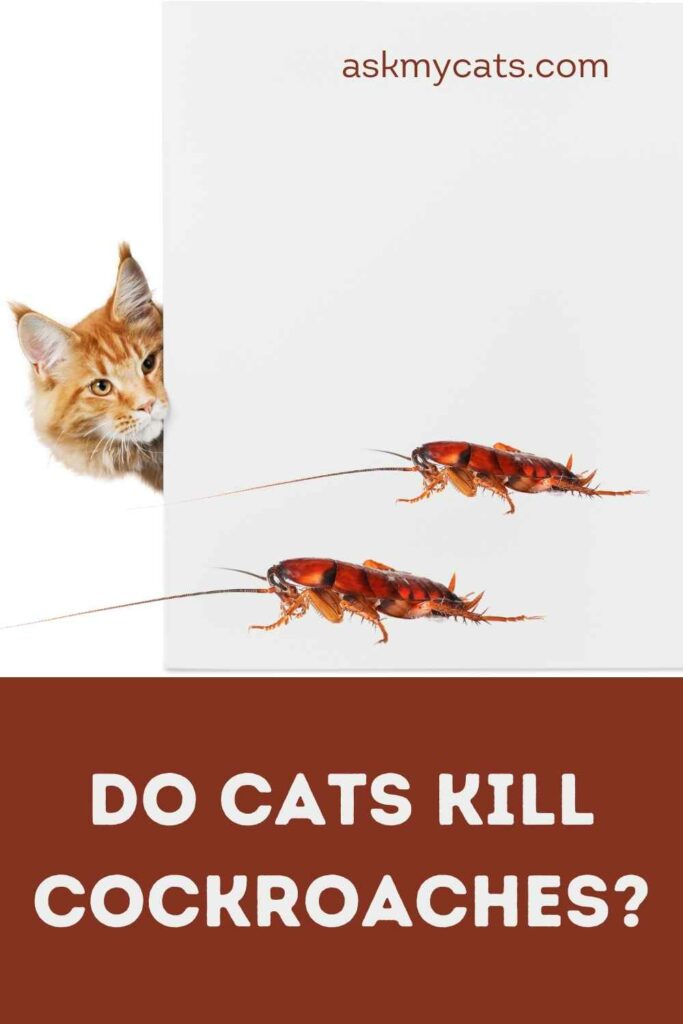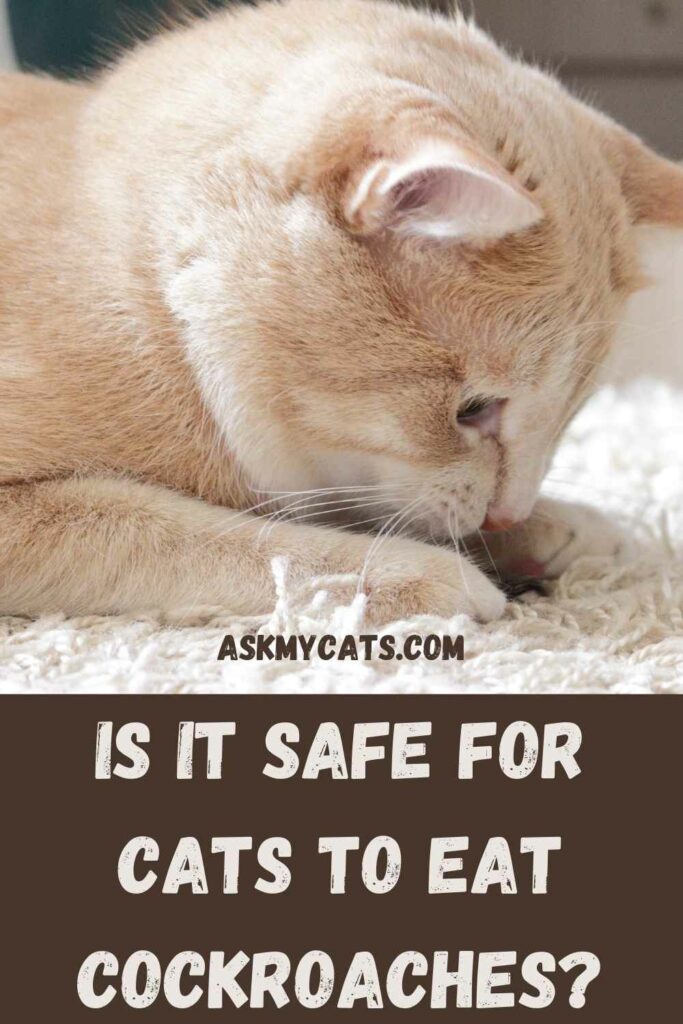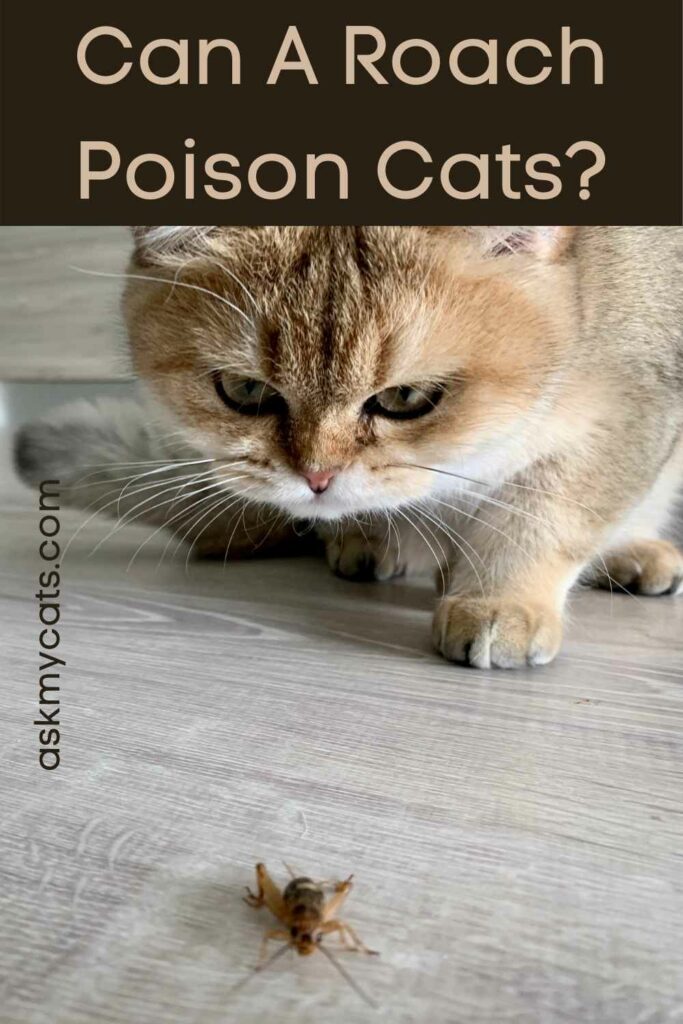Cockroaches are a nuisance, but eliminating them with chemicals or hand traps does not always work. If you want a natural approach, bringing in a cockroach-hunting animal appears to be the best option.
Cats are the most popular of all natural choices. Cats, after all, have been mankind’s go-to pest-killer for millennia.
Cats consume cockroaches to satisfy their predatory impulses. While eating one roach is unlikely to damage your cat, there are several external variables that might create difficulties for your kitty, such as digestive disorders and pesticide consumption.
So, without wasting any more time, let’s read about cats eating cockroaches!


Give Your Cat the Perfect Day
Get the Free Ebook!
Do Cats Eat Roaches?
Cats can eat roaches by killing them easily.
Cockroaches do not frighten cats. They’re mesopredators, and they’re more than ready to hunt down and destroy these hardy pests.
Cats, on the other hand, aren’t the best at keeping cockroaches at bay. Despite their high protein content, cockroaches are not a viable food source for cats owing to their thick exoskeletons.
Cockroaches carry germs and parasites that can be harmful to your cat. Cockroaches are not attracted to cats, however they may be found around their food bowls and litter boxes.
Cockroaches are attracted to these food sources because they are well-known. The key is to maintain these objects clean and well-organized.
It’s also possible that eating the roach is done on purpose. Cats will occasionally ingest items owing to anemia or a condition known as PICA. If a cat is anemic, it is not obtaining enough nutrients from its diet and will try to compensate by eating odd foods such as insects.
Do Cats Kill Cockroaches?
While exerting their natural hunting instincts or simply playing cats can end up killing cockroaches which are the hard-shelled and tenacious bug feared by humans.

Domestic cats have strong hunting instincts inherited from their jungle-prowling forebears, which are encoded into their DNA.
Cockroaches are prey that cats will attack if they see them. A cat’s hunting instincts will be triggered by the scuttle of roaches. Do cats become good cockroach hunters as a result of this?
There have been no scientific studies on the effectiveness of cats as cockroach deterrents, just as there have been none on the effectiveness of dogs as cockroach killers.
However, anecdotal evidence and personal experience appear to have taken the role of scientific study.
Cat owners regularly photograph their cats playing with cockroaches, both living and dead.
Cockroaches are bigger than other insects, so cats can see them and feel their characteristic hard-shelled texture better than other smaller bugs, making them simpler to capture and destroy!
When cats capture and play with anything, they may likely bat the roach around, smell it, bite or lick it, as is characteristic of cats. It’s possible that they’ll consume the roach while examining it with their tongues.
If they are eating as a result of PICA, they may be compelled to eat non-food objects out of boredom or psychological compulsion. If you are concerned that your cat is eating roaches and other objects for one of these reasons, you should see a veterinarian.
Roaches are a typical thing that your feline companion may opt to nibble on, regardless of their motivation. Though it may appear disgusting to humans, it is only another method for a cat to fulfil their insatiable curiosity.
Do Cats Keep Cockroaches Away?
Cats have a long history of being used to manage pests. In fact, several cat species are bred particularly for their hunting abilities.
A case study on nearby farm holdings was published in the British Journal of Animal Behavior. Four of the five farms had cats for pest management, whereas the fifth did not.
Pests were practically non-existent on the farms with cats. Rats and other rodents were specifically mentioned. Because certain prey species have learnt to avoid a cat’s hunting range, this was the case.
Cockroaches perceive bigger animals as a threat that must be avoided. Cockroaches would be deterred from returning if there was a persistent cat, and their population would be reduced.
This isn’t a sure thing, and it’s not as effective as other insect control options. Cockroaches may become more wary in the presence of a cat. They could lurk in the dark or hide in places where cats can’t find them.
Occasionally, a cat may jump on cockroaches and kill one. A cat, on the other hand, is not certain to do so. Domestic cats that are well-fed may have little desire to hunt. A cat’s ability to kill cockroaches may be variable, rendering it inefficient at eliminating the bugs.
Another aspect to consider is the infestation’s magnitude. A single cat fighting a cockroach colony will have little effect on the population. If you notice one cockroach, there are most certainly more around.
Cockroaches may be deterred by cats; however this is dependent on the severity of your infestation. It will also depend on how well nourished your cat is.
Some animals may be deterred from invading your yard by having an outdoor cat. They may also repel rats and birds if you cultivate crops or have a vegetable garden.
Indoor cats can put pressure on cockroach populations by being consistent in their presence, but can cats completely eliminate cockroaches?
Is It Safe for Cats To Eat Cockroaches?
Cockroaches are not a good food for cats. It’s impossible to know where the pest has gone or what it’s been exposed to. In addition, the bug is tough for the cat to digest, which heightens the danger.

Cockroaches may be a good protein source. These nutrients, however, are not without danger. Cockroaches might be dangerous to your cat.
Cockroaches’ thick exoskeleton, which serves as their natural protection, may be dangerous. Cockroaches are also known to carry parasites. That doesn’t even take into consideration pesticides or germs.
A cat devouring a few of cockroaches, on the other hand, isn’t reason for concern. Unless you know your cat has been poisoned, it should be able to consume 1-2 cockroaches without issue.
Cockroaches are not poisonous to cats on their own, but that doesn’t mean you should enlist your feline companion’s assistance in eliminating your roach issue.
Exoskeletons are what give roaches that dreadful “crunch” sound when you walk on them. This implies that if a cat eats a cockroach without chewing it properly, the bits may become trapped in their throat and cause them to choke.
These fragments can also be irritating to the cat’s digestive system, causing vomiting. When a cat consumes roaches or other insects with exoskeletons on a regular basis, it might harm their teeth, which aren’t designed to chew on objects with that texture.
The exoskeleton of a cockroach is a choking danger for cats. Shards of this shell can become trapped in the cat’s throat even if eaten up. This is not only painful for the cat, but it can also strangle it. It may also choke or cough out a hairball the next time it eats or coughs.
The shards have the potential to injure or lacerate a cat’s neck. Cockroaches that are larger can obstruct a cat’s throat. Before eating, cats are unable to crush a cockroach’s shell into small, non-hazardous bits.
As a result, unlike other animals that consume cockroaches, they are unable to minimize this danger.
The shell can also irritate the mouth. Cockroaches are commonly seen crawling through sewers and rubbish, and they might be coated in germs. It just takes a minor cut for your cat to develop an oral infection a few days later.
A cockroach’s shell is mostly indigestible, aside from being a choking danger. The digestive fluids of the cat may try to break down the shell.
Larger fragments, on the other hand, will be relatively undamaged. This is why your cat could vomit up pieces of the bug it just ate. Its litter box may also include shell fragments.
Cats, unlike other animals, do not have the ability to grind their food. Similarly, they are unable to discover workarounds such as gastritis and gizzard stones.
As a result, everything that the teeth and digestive acids are unable to break down will mostly pass through its system whole.
Any indigestible substance passing through an animal’s digestive tract has the potential to clog it up. This causes a variety of health issues, some of which can be life-threatening if not addressed. Surgery or medical therapy may be required.
Can A Roach Poison Cats?
Cockroaches aren’t poisonous. They have a moderately abrasive bite that can cause swelling and discomfort.

Even so, venom isn’t an issue, which will come as a comfort to many.
Cockroaches, on the other hand, are considered an invasive pest in many houses and are handled as such. To get rid of these pests, several individuals have used chemical deterrents and poisons.
A cat might become unwell after eating a cockroach that has been infected. Exposure to a hazardous solution may need a visit to the veterinarian if the cat is young, elderly, or already ill.
Some pest control products claim to be safe for dogs. Directly eating the toxin, on the other hand, can create problems. It’s possible that a cat that smells the poison or cleans it off its paw will be OK.
Eating a whole cockroach that has been dowsed, killed, or otherwise tainted by the poison, on the other hand, might be harmful to their system. The following are examples of possible outcomes:
- Irritation of the mouth, throat, or stomach
- Toxicities
- Digestive distress
What If My Cat Eats A Poisoned Roach?
It’s not a big deal if your cat eats a couple of cockroaches. Unless you know your cat has been poisoned, it should be able to consume 1-2 cockroaches without issue.
Humans who aren’t specialists in insect behavior can mistake a less common, more hazardous bug for a cockroach, which means that if your cat eats it, the insect might be poisonous.
Even cockroaches come in unique kinds, each with its own set of physical characteristics and the potential to be dangerous.
The most harmful roaches for cats are those that dwell in a pesticide-sprayed environment. Apartment complexes in congested cities, in particular, are frequently sprayed for pests.
If a cat eats a roach that has pesticide residue on it but hasn’t died, the cat is also ingesting pesticides, which can make them sick and eventually kill them.
While cats may like playing with, hunting, and eating roaches, it’s better to keep them out of the house. This is true for the majority of insects.
In principle, they are non-toxic, but they can be misdiagnosed, cause choking or stomach problems, or contain pesticides or chemicals that are dangerous or fatal to your cat.
If your cat lives in an area where cockroaches are a common occurrence, it’s essential to address the problem and keep your cat safe.
Do Cats Attract Cockroaches?
Cockroaches are not attracted to cats.
However, if their food and litter boxes aren’t cleaned on a regular basis, they might get contaminated. Cockroaches are drawn to food sources that are consistent. Litter boxes and food dishes for cats are:
- Out in the open
- Often left unattended
- Tucked away where there is little foot traffic
Cockroaches love them since they’re a great source of food. Cockroaches are attracted to cat food stored in non-airtight containers. Flimsy storage bags can decay or be eaten through, allowing pests to access their contents.
How To Keep Cockroaches Away from Cats?
Always make sure your cat’s feeding bowls are free of leftover food to avoid attracting cockroaches.
Consider giving your cat smaller quantities in the morning and night if you keep dry food out during the day. As a result, the cat consumes all of the food in a short period of time. It won’t offer bugs with leftovers by unintentionally.
Similarly, ensure sure the cat’s food is kept in the right containers. It also keeps the food fresher for longer by preventing bugs from smelling it. When it comes to the litter, consider using crystal litter (which is inedible to cockroaches) or cleaning it more frequently.
Do Cats Help With Cockroaches?
Your cat may frighten away other cockroaches if it vigorously hunts and kills any it encounters.
Cockroaches will escape and hide if they are seen as a threat. This applies to most things that are larger than they are. If there is a stable food source, however, bugs will be more difficult to eradicate completely.
Pest control typically entails depriving pests of their habitat and food. Although cats are efficient in killing cockroaches, there are safer and more effective ways to reduce cockroach populations.
Frequently Asked Questions
Can cats get worms or parasites from roaches?
Insects don’t usually carry parasites; however some do carry stomach worms (Physaloptera). Insects that transmit this parasite are quite uncommon, so you’re typically safe.
Can cats hear roaches?
Some insects are louder than others, so they may be able to hear them, but I doubt they can hear the movements of cockroaches and other little insects like that. They are far more likely to utilize their finely honed vision to identify things like scurrying insects or rats.
Can cats be allergic to roaches?
Food allergies in dogs and cats can also cause gastrointestinal problems. It’s possible that pets will react badly to cockroach allergens (e.g., respiratory issues); however, additional study is needed to confirm this.
Final Words
Cockroaches should not be part of a cat’s normal hunting and playing routine because they have so many other alternatives. They might get one now and again, but the hazards of permitting it to happen on purpose are much too great.
If you have roaches in your house, you probably have a greater problem. The greatest strategy is to eliminate them at the source.
Feel free to drop your questions in the comments section below!
